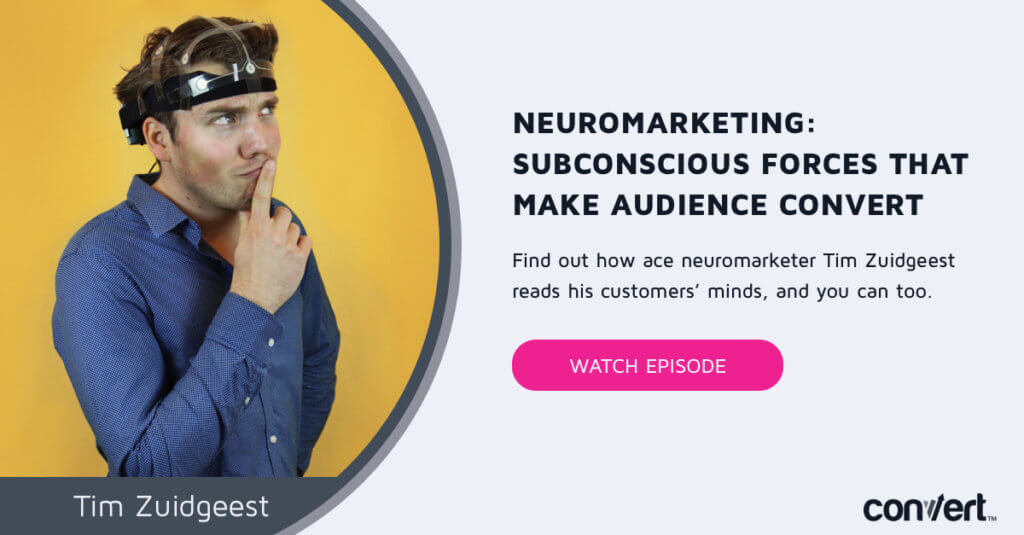Not all optimizers
would know the 168 cognitive biases that faucet proper right into a prospect’s
unconscious and act as that last, “changing” touchpoint.
However being a
neuromarketer first, optimizer Tim
Zuidgeest from Unravel
Neuromarketing Analysis is aware of them. He is aware of higher than
most of us how the buyer mind, the black field that entrepreneurs wish to
decipher, works.
So can an internet site
optimized for conversions — utilizing the identical cognitive hacks Tim makes use of to generate
extra income for his shoppers — get him to transform? Or not like you and me, can he
merely keep “debiased” and tiptoe his means out, unswayed by the tens
of very fastidiously positioned conversion parts as he navigates them?
Because it seems,
data isn’t all the time energy. Trigger Tim too was taken into the loop by the
cajoling on-site Reserving.com (yup, they’re potent).
However he determined to do
one thing about these uber efficient ideas. He determined to decode them into
a 6000-word synopsis that grabbed eyeballs in all places and even earned him a
excessive 5 from Reserving.com’s Co-founder.
We at Convert acquired the
privilege to dig into this seminal work of Tim. And we’re glad to convey you
three of the highest cognitive biases which have propelled Reserving to 88 billion
{dollars}.
And right here they’re!
Base Fee Neglect
The bottom fee neglect bias kicks in once you — as an alternative of taking a look at all the data earlier than you — place extra weight on some particular piece(s) of data. And because of this find yourself misjudging the total image.
Entrepreneurs use the bottom fee neglect precept to subdue the customers’ consideration on their normal info and shift it to some particular objects that can get them to behave.
All through his reserving expertise on Reserving.com, Tim stumbled throughout a number of situations of the bottom fee neglect precept in motion. He repeatedly noticed prompts that made him ignore normal info (like the general capability of some lodging) and concentrate on the specifics (that have been primed to get him to behave ). For instance:
- “15 persons are at present taking a look at this room.” Now, 15 individuals is likely to be taking a look at this room, however hey there are 150
precisely related rooms within the resort! - “4 different individuals regarded on your dates within the final 10
minutes!” Nice, however did they even seek for
THIS resort? Or the gazillion properties Reserving.com hosts? - “Booked 5 instances on your dates within the final 12 hours.” This one is barely extra “truth based mostly”. However once more, in case you are wanting
at a resort then what % is 5 rooms? 50%? Or simply 10% of the whole resort
capability?
As you possibly can see, these prompts are
strategically positioned to create a way of urgency.
And the urgency clouds the higher judgment of us easy people, transferring us to behave (e-book), when frequent sense and math would present that taking our time is completely effective, and we will even have a look at different choices (gasp!)…with out this one disappearing ceaselessly.
Shortage
Shortage, the sixth of Dr. Robert B. Cialdini’s ideas of persuasion, makes you all of the sudden discover one thing to be extra worthwhile and fascinating, just because it’s scarce (otherwise you understand it to be so).
This precept explains why a well-liked
superstar or model’s “restricted” version sells out quick or why individuals
rush to assist themselves when the bartender makes the “final name.” The
mere indisputable fact that one thing is out there solely in a scarce provide or just for a
sure interval consumes our minds and we wish to act quick (nearly on impulse)
with out giving a lot thought into the validity of the assertion.
Or even when we do want that “scarce” merchandise at
all within the first place.
For entrepreneurs, shortage has all the time been a
go-to conversion hack, particularly for ecommerce web sites.
Whether or not it’s gross sales campaigns that work on an
invite-only foundation or vacation campaigns with massive countdowns, the shortage
precept is difficult to bypass.
On Reserving.com, Tim was repeatedly pitched rooms with prompts stressing on how quickly they might e-book out:
- “Deal of the day room.” A typical time-based shortage tactic promising an ideal worth for the room at this time, however just for at this time.
- “‘See our final accessible rooms >.” A loud and clear assertion hinting on the concept of the resort getting booked out quickly.
- “Nice worth at this time!” Once more, no promise right here of getting an ideal worth tomorrow however comfy ambiguity round what “nice worth” appears to be like like.
Not simply these, Tim was additionally proven an
lodging that was booked out. Why?
As Tim explains, to emphasize much more on how scarce the supply might be and the way one wanted to e-book, like actually quick, to get a superb room.


Additionally, whereas it would look unusual to see an unavailable factor (a resort room, on this case) being positioned so prominently earlier than a lead on an internet site, it’s not so unusual. This deliberate tactic successfully creates a way of immediacy, and works even within the offline world (assume empty cabinets that get you to inventory).
Dedication and Consistency
The
precept of consistency works due to the interpersonal strain you might have
to really feel (and be) according to no matter you’ve dedicated to.
That means
when you resolve to do one thing (or say a sure to a small ask), you’d be extra
prone to keep on with your resolution and comply with it by way of (or say sure to the
subsequent, greater asks).
Savvy
entrepreneurs use the precept of consistency for every part, proper from producing leads (making low stakes
presents like a free e book obtain adopted by the excessive stake ones) to encouraging individuals to finish their signup
course of (with UI parts and micro copy that tug at their inherent
behavioral impulse for staying constant).
Tim
encountered a number of situations of the consistency precept on the Reserving.com
web site.
As soon as he started the reserving course of, he was reminded in myriad delicate methods of his preliminary dedication and his resolution to provoke the reserving course of, thereby pushing him to be constant and go to the end line:
- “Danger Free: You possibly can cancel later, so lock in
this nice worth at this time!”
Studying minds? Reserving understands that the second earlier than dedication is the
most antsy. So it goes for the proverbial jugular, addressing the resistance
level of danger immediately. This removes any nervousness round staying constant. - “You chose:” Additionally on the reservation web page, you might have a easy
however intelligent hack exhibiting you the lodging you selected. You simply took motion
and “chosen” one thing. Now don’t again up in your digital phrase by abandoning
the method. - “Virtually finished.” This alone makes you’re feeling good that you just stayed
constant together with your resolution and pursued it, and that you just’re nearly on the
end line.
Multi-step
varieties, progress bars, UI design and duplicate parts are a number of the most
efficient instruments that entrepreneurs use for implementing this precept.
The important thing to getting nice outcomes, nevertheless, lies in making the preliminary dedication straightforward and small. As a result of from that time onwards you’ll have the prospect’s need for consistency working for you.
Ethics and All
Hear, you will need to have identified about these biases
all alongside. What Reserving does is it takes psychological ideas which are
usually obscure and exhibits precisely HOW they will work in the actual
world for very actual earnings.
Earlier than we wrap this up although…there’s a
phrase of warning.
Neuromarketing has all the time been highly effective.
And now it’s accessible too.
For instance, a while again, $50,000 would let
you faucet into how your stimuli (advertising and marketing messaging or photos) have an effect on the
electrical alerts of about 30 of your prospects’ brains. After which experiment
together with your larger viewers by extrapolating your findings.
Now, nevertheless, such analysis is way
“cheaper.” For example, a qualitative research with 10 members would ‘solely’ set
you again € 7700.
However on condition that the mind solely makes use of 2% of its
power for aware exercise, all of the unconscious processing — that
neuromarketing ideas enchantment to — can have an effect on customers in additional methods and to
greater levels than they’d be comfy with.
Jeff Chester, govt director of the Heart
for Digital Democracy, raises issues about the identical. He says:
“It’s having an impact on
people that people will not be knowledgeable about,” and needs to be
regulated. He additionally explains that whereas adults have protection mechanisms that may
assist them differentiate between what’s true and never, promoting that’s “purposely designed to bypass these rational
defenses” requires higher authorized defenses.
As the sector evolves and rules and legislations meet up with its improvements, we will nonetheless use these guaranteed-to-work ideas. The one caveat: We have to use them responsibly. And ethically. Tim and his agency, as an example, use the “mother take a look at” earlier than taking up a consumer or venture. They solely assist a enterprise unleash the facility of neuromarketing in the event that they’d be comfy with their mothers participating with it. So inform us: Have you ever ever experimented with any of those mind hacks? And the place would you draw the road (as a result of we will all agree these ideas go deep)?
Initially printed Could 18, 2020 – Up to date November 10, 2022
Cellular studying?
Authors
Editors

Carmen Apostu
In her function as Head of Content material at Convert, Carmen is devoted to delivering top-notch content material that folks can’t assist however learn by way of. Join with Carmen on LinkedIn for any inquiries or requests.






